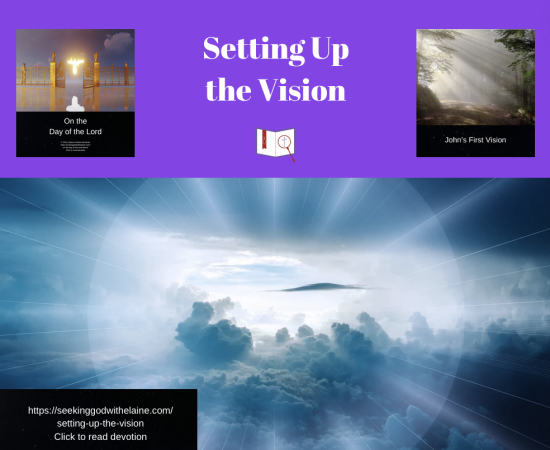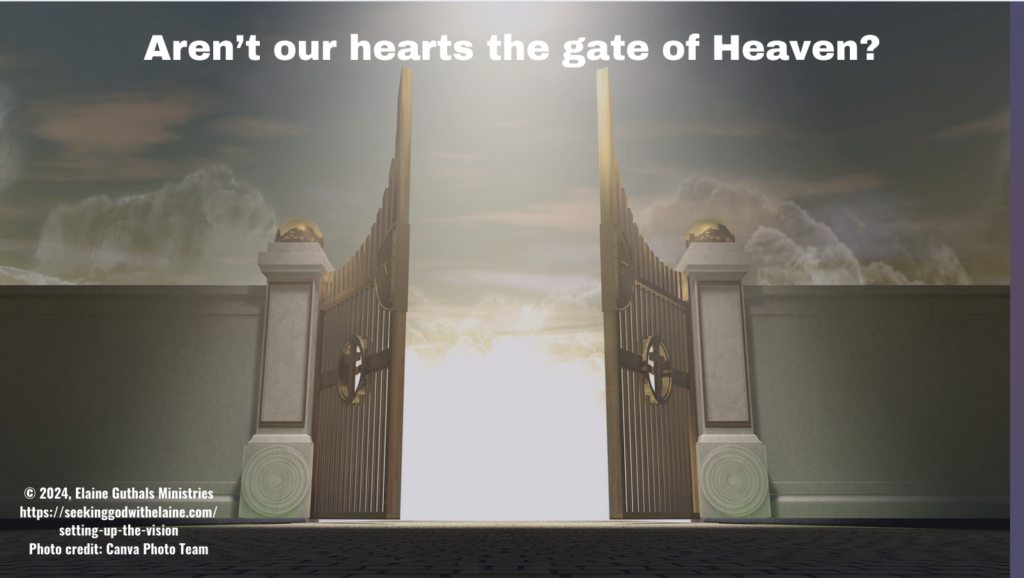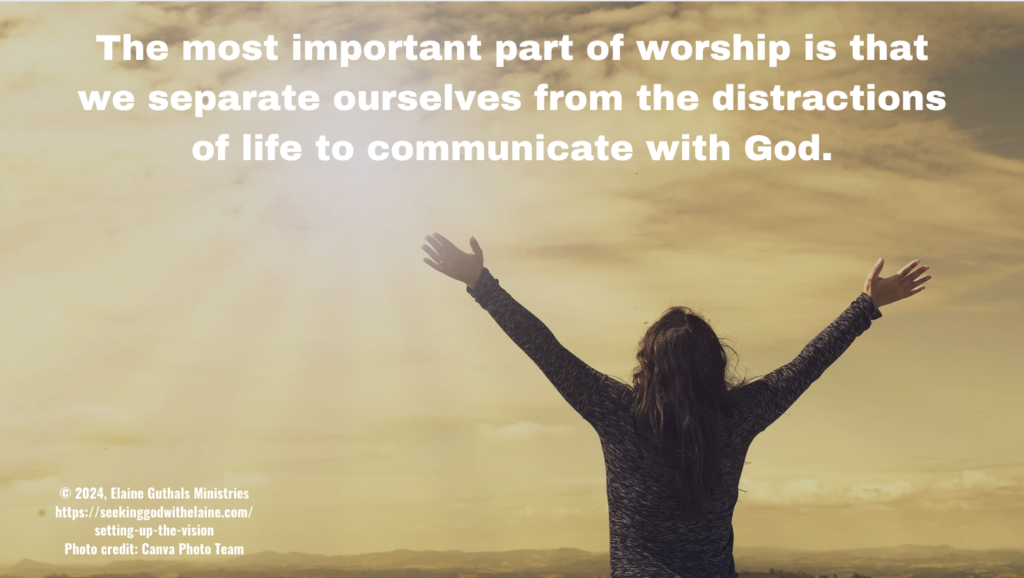John set the stage for the first vision he was given. This devotional reading looks at where he was, what he was doing, and what happened next.
Nuggets
- The beloved disciple of Christ was in a difficult place.
- John was alone in his worship service.
- John heard a voice telling him what to do.
- John was instructed to document what he saw.
- The individual letters written to the seven congregations follow an established pattern.

John’s audience probably knew where John was. Still, he took the time to reinforce where he was and to lay the groundwork for discussion of the message God gave him.
This is a good literary device. It gives John’s audience time to settle in before they read what God has for them to know.
Let's Put It into Context
To read devotions in the On the Day of the Lord theme, click the button below.
Devotions in the John’s First Vision series
John on Patmos
“I, John, your brother and partner in the tribulation and the kingdom and the patient endurance that are in Jesus was on the island called Patmos on account of the word of God and the testimony of Jesus (Rev. 1: 9 ESV)
The beloved disciple of Christ was in a difficult place.
We talked before that the man who never mentioned himself by name in either the gospel or the three epistles that he wrote gave his name three different times in the first chapter of Revelation (Rev. 1: 1, 4, and 9). This is the last time.
Your brother and Partner in the Tribulation and the Kingdom
John identified his readers as brothers and partners.
Instead of leading with he was a cousin to Jesus and companion of the other Apostles – and the only remaining Apostle alive at this time – John humbly lowered himself to be their equal.
John’s readers could take these words to be true because they knew him. He had already gained their respect because of the credibility of his previous letters.
This is especially true if these were congregations that John had founded. He had already built a rapport with them. They probably were more than friends.
As fellow members of the family of God, they would have been brothers and sisters in Christ. They would have been partners in the Kingdom of God. The Kingdom of God is a spiritual kingdom that describes His sovereign reign.
Since it isn’t an earthly kingdom, it is an eternal kingdom. God is more concerned about our the spiritual – eternal – condition of our souls.
We’ve said many times that God isn’t interested in our physical bodies and physical life. Since it is spiritual, it is more about our character.
We only enter the Kingdom of God when we are His children. “But to all who did receive him, who believed in his name, he gave the right to become children of God, who were born, not of blood nor of the will of the flesh nor of the will of man, but of God” (Jn. 1: 12-13 ESV).
Boner said that each of us inherits the Kingdom of God equally. Some may have the faith of a mustard seed. Some may have the faith of a redwood. But we all get the same eternal life.
Resource
Salvation is the same for everyone. “Because there is one bread, we who are many are one body, for we all partake of the one bread” (I Cor. 10: 17 ESV).
Yes, talking about bread is very relevant here. Jesus is the Bread of Life (Jn. 6: 35). That life is gained through salvation.
John highlighted he was a partner in tribulation. We have to get through the tribulation of everyday life and targeted persecution first. There are no short cuts doing that. Even John wasn’t immune to tribulation.
Look at this. John was probably hurting. He wouldn’t have had an easy time.
Pastor Steve told me that, in ancient Roman history, it states John was first boiled alive. When he didn’t die, he was exiled to Patmos.
Oh, yeah. John was hurting and going through tribulations of his own!
But here John was encouraging his readers.
Patient Endurance
God calls us to be content while we wait for the fulfillment of His promises.
Patience is an option because God won’t leave us. He will always be there when we need Him.
Think of it this way. We have to patiently endure trials. We have to patiently endure this life so that we can enjoy the Kingdom of God in the next life. Patience is the connection between trials and the Kingdom of God.
Young agreed. He wrote, “The patience of Jesus Christ. This word includes a patient enduring, a patient waiting, and a patient persevering.”
Resource
How are we to do that? “When they had preached the gospel to that city and had made many disciples, they returned to Lystra and to Iconium and to Antioch, strengthening the souls of the disciples, encouraging them to continue in the faith, and saying that through many tribulations we must enter the kingdom of God” (Ac. 14: 22 ESV emphasis added).
Island of Patmos
Patmos was a desolate prison island in the Aegean Sea that was used as a place to banish criminals. On today’s map, is about 35 miles out from the west coast of Turkey.
John had been exiled to the island of Patmos for not worshiping the emperor Domitian. Based on the time John was believed to have been imprisoned on Patmos, it is estimated that he wrote the book between 90 AD and 95 AD.
I had always thought that John was alone on the island, but he wasn’t. Instead, he would have contact with other prisoners as he worked in the mines on the prison colony.
Look what the Homilist said about this. The article entitled St. John — a Sublime Character states, “On this desolate island, amidst the greatest villains of the age, this great character was banished. Strange that the Providence of heaven should have allowed one of the most Christly men on the earth at that time to live for an hour in such a scene. But Patmos to John, and Patmos to the other residents, was a different place. To John it was a theatre of sublimest revelations — the very gate of heaven.”
Resource
Ooo, baby. That makes it sound like John was in maximum security lockup. No, he wasn’t alone on the island. He was on his mission field.
Again, disciples are going to experience persecution. We aren’t going to get a free and easy ride. We are sometimes going to have hard lives.
But I love that last line. Patmos was the gate to Heaven.
John was going through tribulation and found the gate to Heaven.
But really, aren’t our hearts the gate of Heaven?

The Lord’s Day
“I was in the Spirit on the Lord’s day …” (Rev. 1: 10 ESV)
Alone
John was alone in his worship service.
Not we, I. “I was in the Spirit …” (Rev. 1: 10 ESV). This would include prayer.
True, John was on a prison island, but it wasn’t like he was there by himself. There were other prisoners there.
I’m sure he would have been witnessing, but we don’t know if he was winning converts. It would be a safe bet to say, though, that John was probably lonely.
We can worship God on our own. We are expected to worship God individually.
Yes, we are also expected to worship corporately. But that does not mean we aren’t supposed to worship God only on Sunday morning.
We are expected to worship God daily.
The most important part of worship is that we separate ourselves from the distractions of life to communicate with God.

In the Spirit
John wasn’t the first prophet to be taken up in the Spirit.
Other prophets had been transported in the Spirit to participate in visions. “Then the Spirit lifted me up, and I heard behind me the voice of a great earthquake: ‘Blessed be the glory of the Lord from its place!’” (Ezek. 3: 12 ESV).
Worship is where we put ourselves in line to listen to God. We praise Him and thank Him. But most of all we open the eyes our hearts to listen to Him.
It also edifies us and transforms us. Transformation is in our job description. “Do not be conformed to this world, but be transformed by the renewal of your mind, that by testing you may discern what is the will of God, what is good and acceptable and perfect” (Rom. 12: 2 ESV).
The Disciple’s Job Description
Complete Job Description
The purpose of this transformation — and worship, for that matter — is to sanctify us.
When we separate ourselves for worship, we are also in the Spirit. No, we won’t be transported elsewhere or see a vision.
We will have a stronger connection with God. Our focus will be totally on Him. We will be able to hear Him talk to us.
On the Lord’s Day
Even alone, John worshiped God on the Lord’s Day.
“… on the Lord’s Day …” (Rev. 1: 10 ESV) could mean on a Sunday, or it could be a shorthand for on the day of the Lord. Well, this is what the vision was all about but hasn’t happened yet.
Of course, every day belongs to God.
We have to worship God regardless of how we feel at the time. Regardless of the circumstances, we are to praise Him and be content.
We aren’t told if being in the spirit is the Holy Spirit or another spirit. Regardless of his guide, we know John was in a spiritual state.
John could only have visions of the Day of the Lord if he were in the Spirit.
Voice of the Trumpet
“… and I heard behind me a loud voice like a trumpet” (Rev. 1: 10 ESV)
John heard a voice telling him what to do.
God’s voice has been categorized before as sounding like a trumpet. “Cry aloud; do not hold back; lift up your voice like a trumpet; declare to my people their transgression, to the house of Jacob their sins” (Isa. 58: 1 ESV).
God’s voice is Jesus’ voice.
In this instance, the voice like a trumpet spoke coherent thoughts. There was direction given.
Notice, it says it was a loud voice. I think we could say it was a clear and clean voice.
Thomas gave us a list of characteristics of the voice. He wrote that it had
· “Royalty.
· “Purity.
· “Penetration.
· “Firmness.
· “Dominion.
· “Victory.
· “Brightness.”
Resource
I know. Wouldn’t it be wonderful to hear the voice of Jesus?
But what we have is the faith of the unseen. We won’t get to hear Jesus’ voice until we are called home.
Write What You See
“saying, ‘Write what you see in a book …’” (Rev. 1: 11 ESV)
John was instructed to document what he saw.
The job given to John was to be a scribe. He wasn’t asked to interpret it or form an opinion.
Ooo, baby. The Homilist wrote that there are two Bibles. One is God’s written Word.
The other is God’s Word that He writes on our hearts and minds through the Holy Spirit. “This is the covenant that I will make with them after those days, declares the Lord: I will put my laws on their hearts, and write them on their minds” (Heb. 10: 16 ESV).
Resource
God’s Word is an introduction. He more fully reveals Himself to us — His children — once we become His children.
This is divine revelation just for His disciples.
The Seven Churches
“… and send it to the seven churches, to Ephesus and to Smyrna and to Pergamum and to Thyatira and to Sardis and to Philadelphia and to Laodicea” (Rev. 1: 11 ESV)
The individual letters written to the seven congregations follow an established pattern.
Remember, in a past devotion we talked about the Complete Jewish Bible translates what we call the church as Messianic communities. So, I am going to call them Messianic communities — or just congregations, even though the verses I pull will still use the word church.
Revelation 2 and 3 look at each of the churches to whom the letters are addressed individually. So right now, we are going to look at them collectively.
The individual letters all recognize Jesus as Lord, the Head of the Church. Not only does He have the authority over these churches, but He also has history with them.
All letters basically have the same structure.
· Greeting
· Commendation
· Condemnation
· Closing
Yes, this is in the format of a good evaluation. It starts out with encouragement.
But don’t lose sight that most of these letters are judgments. The congregations have things they need to clean up.
Where judgment was given, the opportunity for deliverance was also given. We can’t just figure things out on their own.
God usually tells us what we need to do to get right with Him.

When we do change things around to God’s way, we do gain God’s promises.
The sad part is five of the seven churches had major issues. Even if they thought they were doing things right, they weren’t.
Two churches are commended, two are reprimanded, and three contain a mixture.
Making the Connections
We’ve been talking about our UNR book — understanding not relevant. Exell agrees that we aren’t going to understand everything. He wrote, “Man is unable to interpret the spiritual meaning of the ages.”
Resource
We have to tread carefully here. No one is going to get everything right. We aren’t God. We don’t know.
We so often — with many things we read in God’s Word — we think we have it all figured out. We just know our opinion fits in perfectly with what God has planned.
Have you ever overhead a “conversation” with one person who thinks the Church will be raptured at the beginning and another who believes the Church won’t be taken until the Day of the Lord?
Talk about their way is the only way!
We can believe what God reveals to us. But others may have a different opinion. We can’t be sure who is right and who is wrong.
We have to allow others to have their opinions as long as they don’t go against something plainly written in God’s Word. We have to acknowledge that we may be wrong.
How Do We Apply This?
- Look for God to reveal Himself to us.
- Realize that disciples will be persecuted by wicked men.
- Encourage other disciples even when we are going through temptation.
- Engage in a day of rest to commune with God on the Sabbath.
- Attend services in God’s house regularly.
- Look forward to attending those services with joy.
- Resist evil.
Resources
Father God. Thank You for the reminder that we can – and should – worship You on our own. We don’t have to exclusively go to Your house to praise You. We can worship You where we are. That is in addition to worshiping with like-minded believers. We look forward to worshiping You face to face. Amen.
What do you think?
Leave me a comment below (about this or anything else) or head over to my Facebook group for some interactive discussion.
If you don’t understand something and would like further clarification, please contact me.
If you have not signed up for the email providing the link to the devotions and the newsletter, do so below.
If God has used this devotion to speak with you, consider sharing it on social media.